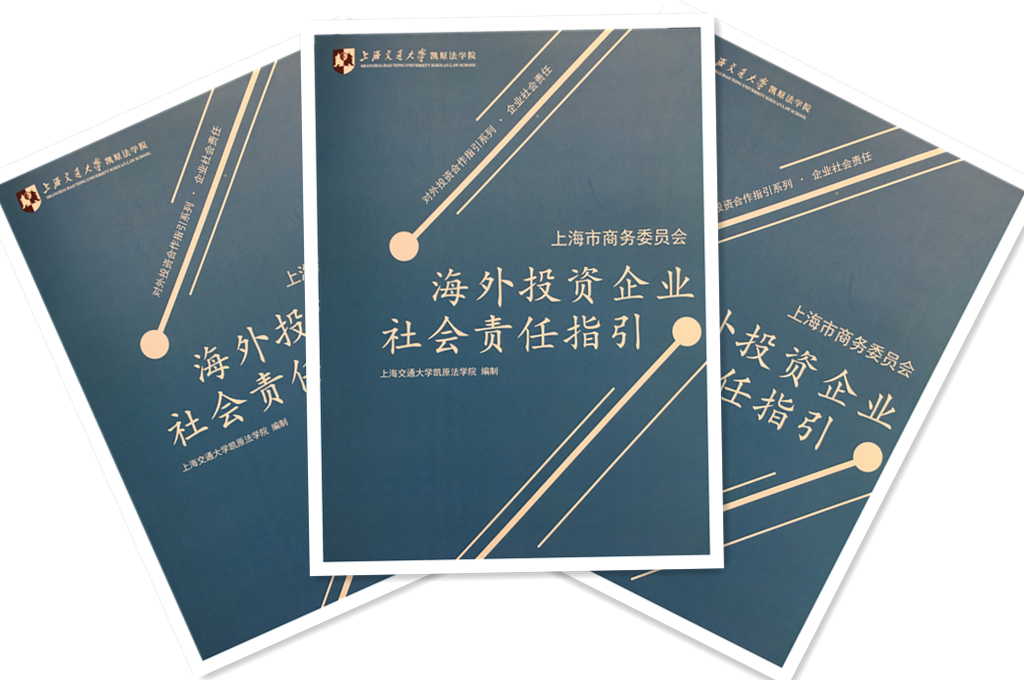The corporate social responsibility management system refers to the relevant institutional arrangements and organizational construction to ensure that the enterprise fulfills the corresponding social responsibilities and achieves sound development. It is a major task related to the long-term development of the enterprise. The fundamental purpose of investment due diligence management is to prevent and control social responsibility risks in the investment process, that is, the impact of social responsibility-related uncertainties on investment objectives. An effective management system is a powerful guarantee for the implementation of CSR strategies.
In April 2017, the Shanghai Municipal Commission of Commerce entrusted the Kaiyuan Law School of Shanghai Jiaotong University to compile the "Guidelines for Corporate Social Responsibility in Overseas Investment", which covers 6 major regions, 48 key countries and 6 top 6 overseas investment companies. This major industry aims to provide detailed and comprehensive guidelines for Shanghai enterprises to better connect with international rules, promote industrial upgrading, sustainable development, and promote the legalization of overseas investment and business by means of internal governance.

2017 Overseas Investment Corporate Social Responsibility Guidelines
Since the "going out" strategy was put forward, Chinese enterprises' foreign investment and cooperation have developed rapidly, and now they have become one of the most important forces in the field of international investment. With the implementation of the "Belt and Road" initiative, Chinese enterprises will embrace more market opportunities and exert greater development potential. "Going out" for Chinese enterprises to invest overseas is the only way for Chinese industries to expand new markets and utilize new resources. It is also an inevitable link between Chinese enterprises and the host society, environment and people's livelihood. Therefore, Chinese companies "going out" must pay high attention to both the economic impact and the social and environmental impact on the location where they invest.
In 2015, the Chinese government put forward the development concept of "innovative, coordinated, green, open, and shared", and in the same year, the United Nations adopted the "2030 Agenda for Sustainable Development". The realization of these concepts and goals depends on the implementation of responsible corporate behavior. support. As an important bridgehead and port of departure for the "going out" strategy, Shanghai's overseas investment has ranked first among all provinces and cities in the country in terms of both stock and increment. Therefore, the Shanghai Municipal Commission of Commerce organized the research and formulation of the "Guidelines for Corporate Social Responsibility in Overseas Investment" (hereinafter referred to as "the "Guidelines") to help Shanghai enterprises planning or already making overseas investments to evaluate their investments comprehensively, scientifically, rationally and responsibly. The comprehensive interaction between the project and the local social, economic and environmental conditions lays a solid foundation for the responsible and sustainable overseas investment and operation of Shanghai enterprises.
The Guidelines are based on the risk-based due diligence approach established in the United Nations Guiding Principles on Business and Human Rights and commonly adopted by many international and regional corporate social responsibility or sustainable development legislation, standards and initiatives. This method requires enterprises to fully understand the requirements and expectations of stakeholders on the basis of a comprehensive assessment of their own conditions and the environment in the investment process, and to continuously identify and evaluate the impact of investment projects and activities on stakeholders and sustainable development. actual and potential impacts, integrate assessment results into investment due diligence mechanisms to take appropriate responses and actions, track the effectiveness of responses and communicate with stakeholders, where necessary, progress in preventing and eliminating impacts.
The fundamental purpose of this method is to identify and control risks related to sustainable development for overseas investment projects, so that investment projects can be better accepted and supported by local stakeholders, and in turn, investment projects can make better use of local resources and economic opportunities. In order to facilitate the integration of this method with the existing management system of the enterprise, the Guidelines also refer to the systematic methods of management systems such as ISO90001 and ISO14001. |
